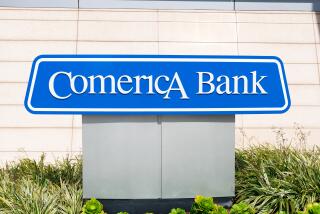Market in Problem Loans Developing : Banking: Companies are forming to match buyers and sellers of loans held by failed thrifts and others.
- Share via
NEW YORK — What happens to the billions in loans held by failed thrifts or left lurking on the books of banks and insurance companies?
A number of investors and real estate specialists are forming new companies throughout the country to match buyers and sellers of these problem loans, similar in some respects to the way brokers trade stocks.
The potential market is small compared to the size of the $3.9-trillion market in U.S. stocks but still is considerable. The nation’s banks had $74.9 billion in troubled or non-performing loans by the end of March, says Sheshunoff Information Services Inc., which tracks the performance of banks and thrifts.
Stephen A. Roth, president of the Los Angeles-based real estate investment firm Secured Capital Corp., said there were barely a half-dozen active players in early 1991 in the market for problem loans.
This year his firm dealt with 225 separate bidders when it brokered a sale of $4 billion in distressed commercial loans and mortgages for the Resolution Trust Corp., the government agency that liquidates failed thrifts.
“Eighteen months ago, nobody ever dreamed a market for non-performing real estate loans would ever be as deep as it is,” said Roth.
Buyers of distressed loans generally are attracted by the higher interest rates, believing they justify the risk. Some investors buy the loans on the bet that they will rise in value as the health of the borrowers improves.
One firm in Chicago, JBS & Associates Inc., is drumming up support for a formal exchange in troubled loans.
As envisioned by Joel Zegart, president of JBS Associates, the JBS Financial Instruments Exchange would serve as an auction market for everything from credit card receivables to bundles of student loans. The exchange is preparing for its first auction in February, 1993.
Key features of the exchange include high-tech computer imaging technology, in which loan documents are electronically scanned and stored on computer disks.
The exchange would pool the loans according to specific types or originating from specific geographic locations.
The sales will occur during “open outcry” auctions, to take place each quarter. Only investors experienced in the potential risks of the market can participate.
“We don’t want novices coming in or newcomers without an understanding of the complexities involved,” Zegart said. The loans typically would be sold in $5-million or $10-million packages.
JBS & Associates is one of several auctioneers nationwide that have been liquidating property for the Resolution Trust Corp. In the last 10 months, JBS has sold about $400 million in current and delinquent loans for the RTC.
Buyers in the problem loan market include investment banks, commercial banks and thrifts, and so-called vulture funds, or savvy real estate investors. Banks find acquiring loans through auctions a profitable way to build their business, Zegart said.
A regular marketplace for loans would allow banks to leave weak lines of business and concentrate on their strong points. A bank with a weak position in the credit card business could sell its portfolio through the exchange rather than hiring an investment bank to market the loans.
Zegart’s idea has attracted interest among investors, but some are skeptical. Roth of Secured Capital Corp. said selling distressed loans requires a great deal of specialized research and marketing to attract buyers.
More to Read
Inside the business of entertainment
The Wide Shot brings you news, analysis and insights on everything from streaming wars to production — and what it all means for the future.
You may occasionally receive promotional content from the Los Angeles Times.










